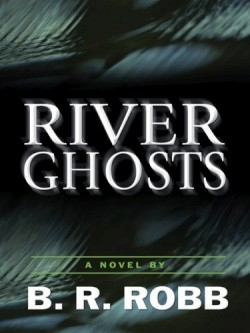River Ghosts
Adult nightmares are often the echoes of childhood recollections, horrors left behind to grow and fester in the fertile earth of imagination. The visions of Richard Hill are no different; the memories of what he witnessed—his mother’s rape and his parents’ murders—resonate through his life like a scream through a never-ending cave.
In B. R. Robb’s River Ghosts, the specters of the past are agitated to life by the release of their convicted murderer. Henry Clayton is freed from prison, exonerated by new DNA testing. Richard Hill, now a hometown police officer, is torn between serving justice and service to his own memories. He explains, “It’s as though a beast I’ve made an uncomfortable truce with has escaped and paces inside me.”
Clayton, whose evil is only matched by his hatred, is part of a fanatical supremacist group and his thirst for revenge puts Richard and his few remaining family and friends in jeopardy. Richard and Clayton run a parallel yet divergent course, two trains hell-bent on reaching their destinations first. While Richard searches for proof of his recollections and Clayton’s guilt, Clayton rushes to erase any that may exist.
The story’s supportive supporting characters add another dimension to this multi-layered tale. Richard’s unattractive, unmarried Auntie Doria is burdened with her deceased brother’s masculine features and excess weight, but her heart is free to give all it can to her troubled nephew. Jack Harter, Richard’s partner, who, in his outward struggle to appear unprejudiced, comes to see Richard as nothing more than a man, and becomes a friend.
Author B. R. Robb’s first novel, The Widow’s Son, won Grand Prize at FirstNovelFest 2000. A graduate of the Loyola School of Law, Robb has skillfully used his experience as a prosecutor, public defender, and guardian ad litem for abused and neglected children to depict the many faces of despair at their most disturbing.
Gifted with a precision for language and a keen eye for detail, Robb writes with the canny ability to choose, with economy, the most appropriate image-provoking words. Written in first person, present tense, River Ghosts is both more immediate and less intimate. The fulsomeness of fragments and staccato sentences, normally reserved for action sequences, lends the entire work an urgency that matches the main character’s need for truth; a need that impels the work along like a gale wind against the back.
Reviewed by
Donna Russo Morin
Disclosure: This article is not an endorsement, but a review. The publisher of this book provided free copies of the book to have their book reviewed by a professional reviewer. No fee was paid by the publisher for this review. Foreword Reviews only recommends books that we love. Foreword Magazine, Inc. is disclosing this in accordance with the Federal Trade Commission’s 16 CFR, Part 255.

